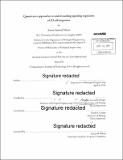Quantitative approaches to understanding signaling regulation of 3D cell migration
Author(s)
Meyer, Aaron Samuel
DownloadFull printable version (22.87Mb)
Other Contributors
Massachusetts Institute of Technology. Department of Biological Engineering.
Advisor
Douglas A. Lauffenburger and Frank B. Gertler.
Terms of use
Metadata
Show full item recordAbstract
For many cancers, dissemination of tumor cells to form metastases is not only a hallmark of the disease but an essential step to mortality. Migration and dissemination are complex, multistep processes, and study of their regulation has been challenging. Metastases need only be driven by a rare subpopulation of tumor cells, and a portion of dissemination is necessarily interaction with the cell's environment and thus cell extrinsic. Experimentally, there is additional uncertainty as exactly how to best assess migration outside of the complex in vivo environment. To develop a systems perspective of invasive disease, we first examine some of the experimental models used to study cell migration. We then apply this knowledge to examine regulation by proteases of endometrial cell invasion, and the pro-migratory effects of receptor crosstalk in breast carcinoma cells. Finally, extending from clear limitations in our knowledge of signaling regulation specifically within the invasive subpopulation of cells, we develop a model of ligand-mediated signaling for a receptor often expressed specifically during the process of dissemination. In total, this thesis extends systems biology techniques to the study of cell migration within the extracellular environment, with focus on that subpopulation of cells most directly implicated in the formation of metastatic disease.
Description
Thesis: Ph. D., Massachusetts Institute of Technology, Department of Biological Engineering, 2014. Cataloged from PDF version of thesis. Includes bibliographical references (pages 110-127).
Date issued
2014Department
Massachusetts Institute of Technology. Department of Biological EngineeringPublisher
Massachusetts Institute of Technology
Keywords
Biological Engineering.